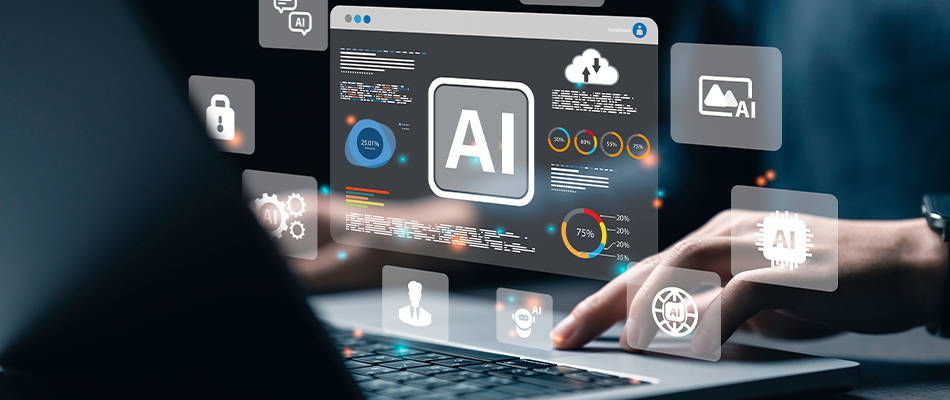Artificial Intelligence (AI), Machine Learning (ML), and Data Science are among the most in-demand fields in the tech industry today. These fields are also becoming the driving force for innovation across multiple industries. Whether it is the development of self-driving cars, personalised recommendations, or predictive analytics, these fields are leading the way in digital transformation.
While AI, ML, and Data Science all fall within the same domain, each has distinct applications and purposes. So, if you are someone planning to pursue a career in any of these fields, you must understand their difference.
In this article, we will explore the AI vs ML vs Data Science landscape, discussing their definitions, differences, relationships, and the career opportunities they offer.
Table of Contents
- What is Data Science?
- What is Artificial Intelligence?
- What is Machine Learning?
- What is the Difference Between AI, ML, and Data Science?
- Relationship between Data Science, Artificial Intelligence, and Machine Learning
- Explore the AI vs ML vs Data Science Salary
- What is the Actual Difference Between AI vs ML vs Data Science?
- AI vs ML vs Data Science – Career Pathways and Skill Sets
- Conclusion
- AI vs ML vs Data Science – FAQs
What is Data Science?
Data Science is a multidisciplinary field that combines the concepts of Mathematics, Computer Science, and Statistics to evaluate and interpret large datasets. It involves collecting, cleaning, and analysing data to reveal patterns, make predictions, and enhance decision-making processes. Moreover, data science professionals use a range of techniques and tools like data mining and data visualisation to transform raw data into actionable insights.
Most companies generate massive amounts of data. Because of that, data science has become crucial in organising and analysing data to drive meaningful outcomes. Further, through methods like data modelling and warehousing, data science ensures that even the most complex and unstructured data can be interpreted effectively. Hence, in the debate of AI vs ML vs Data Science, data science guides companies to improve their operations and achieve organisational goals, especially in a highly competitive business market.
What is Artificial Intelligence?
Artificial Intelligence (AI) is a powerful technology that enables machines and software systems to mimic human intelligence and behaviour. AI enables machines to perform tasks that traditionally require human intelligence, such as planning, problem-solving, and decision-making. It includes various subfields, including Natural Language Processing (NLP), Computer Vision (CV), and Robotics.
Hence, AI systems are designed to think, analyse data, and adapt over time, using techniques like deep learning and pattern recognition. As we try to understand the AI vs ML vs Data Science domains, it must be clear that the goal of AI is to enhance our capabilities, making our interactions with technology more intuitive and efficient.
Learn How is Artificial Intelligence transforming businesses in South Africa.
What is Machine Learning?
Machine Learning (ML) is a branch of Artificial Intelligence that enables computers to learn and improve independently from experience without needing specific instructions from humans. ML systems use algorithms to analyse and identify patterns in large datasets, allowing them to make predictions and decisions based on that data. This allows software applications to process more data and become “smarter,” improving their accuracy and effectiveness over time.
Hence, as we explore AI vs ML vs Data Science, it must be clear now that machine learning allows machines to handle complex tasks and adapt to new challenges in a way that mimics human learning and decision-making.
What is the Difference Between AI, ML, and Data Science?
Understanding the landscape of AI vs ML vs Data Science is crucial as these fields play an important role in reshaping the technological domain. Though they are interconnected, each has its unique focus and applications. In this table, we will highlight the key differences between Artificial intelligence, Machine Learning and Data Science:
| Aspects | Artificial Intelligence | Machine Learning | Data Science |
| Definition | AI refers to systems or machines that mimic human behaviour and intelligence. | ML is a subset of AI that teaches machines to learn from data. | Data Science involves extracting insights from large datasets. |
| Focus | Enables machines to perform tasks requiring human intelligence, like decision-making and problem-solving. | Creates systems that learn and improve from data without explicit programming. | Involves collecting, processing, and analysing data to extract insights. |
| Application | Used in chatbots, voice assistants, robotics, and automated decision-making. | Used in recommendation systems, facial recognition, and automated predictions. | Applied in business forecasting, trend analysis, and fraud detection. |
| Role in Data | Combines large amounts of data using intelligent algorithms for learning. | Uses algorithms to learn from data and improve over time. | Covers the full spectrum of data processing, including sourcing, cleaning, and analysis. |
| Tools | TensorFlow, Scikit Learn, Keras | Amazon Lex, IBM Watson Studio, Microsoft Azure ML Studio | SAS, Tableau, Apache Spark, MATLAB |
| Real-World Examples | Google Home, Siri, Alexa, chatbots | Netflix recommendation system, Spotify playlists, YouTube suggestions | Healthcare analysis, fraud detection, market analysis |
Also, read our article on Data Science Vs Computer Science to gain more insights.
Relationship between Data Science, Artificial Intelligence, and Machine Learning
We can picture the relationship between Data Science, Artificial Intelligence (AI), and Machine Learning (ML) as an interconnected ecosystem. Here, each component plays a crucial role in solving complicated problems and driving innovation. So, as we are in the debate of AI vs ML vs Data Science, let us give you an overview of their relationship.
As we know, data science involves collecting, analysing, and interpreting vast amounts of data to find insights and make informed decisions. This process provides the foundational knowledge for understanding complex systems and trends. AI, on the other hand, uses these data insights to replicate human intelligence, enabling systems to perform tasks like recognising patterns and predicting outcomes.
Here, the role of Machine Learning is to enable the systems to learn from data and improve their performance over time without being explicitly programmed. As a result, it allows AI systems to become increasingly accurate and efficient. Hence, together, they create a powerful system that drives technological progress and solves real-world problems.

Explore the AI vs ML vs Data Science Salary
To understand the aspect of Artificial Intelligence vs Machine Learning (ML) vs Data Science, you must know the salary each field offers. Since these fields are growing rapidly, you can expect a competitive compensation package. However, there are some differences in salary range of each role in AI, ML and data science.
Artificial Intelligence (AI) professionals earn an average base salary of approximately R483,000 per year. Machine Learning (ML) specialists receive an average base salary of around R458,000 per year. Meanwhile, Data Science experts have an average base salary of R464,146 per year. While salaries are quite close across these fields, this highlights the differences in earnings in AI vs. ML vs Data Science. Besides, it is clear that AI roles typically command a slightly higher salary because of their broad applications and task complexities.
What is the Actual Difference Between AI vs ML vs Data Science?
Artificial Intelligence (AI) is the broad field focused on creating machines that can simulate human intelligence, encompassing various techniques and applications.
Machine Learning (ML) is a subset of AI that involves algorithms allowing machines to learn from data and improve over time without explicit programming.
Data Science is the interdisciplinary field that uses statistical methods, data analysis, and algorithms (including ML) to extract insights and solve problems from large datasets.
In essence, AI is the goal, ML is a tool within AI, and Data Science leverages both to derive meaningful information from data.
AI vs ML vs Data Science – Career Pathways and Skill Sets
When exploring the career landscape of AI vs ML vs Data Science, you will find unique career paths that require different skill sets, reflecting their specialised roles. As you make a career out of any of these fields, you should know the available job positions and their essential skills. Understanding this will help you align your skills and interests with the right career path:
Artificial Intelligence Careers:
As we know, AI professionals mainly focus on developing systems that simulate human intelligence. Here are the key job roles and essential skills required for AI aspirants:
- Job Roles: AI Engineer, AI Research Scientist, AI Product Manager, NLP Engineer.
- Skills Required: AI Ethics and Bias Mitigation, Natural Language Processing, Programming (Python, C++), Deep Learning
Machine Learning Careers:
ML aspirants primarily specialise in designing and optimising algorithms to make predictions from data. Hence, given below are the top jobs and skills you will notice in the ML field:
- Job Roles: Machine Learning Engineer, Machine Learning Developer, Predictive Modelling Analyst
- Skills Required: Statistical Analysis and Probability, Model Evaluation, Version control, Programming Languages (Python, C++, Java)
Data Science Careers:
Data science professionals analyse and interpret large datasets to guide business decisions. The following are the necessary skills and job positions you will see in the data science domain:
- Job Roles: Data Scientist, Data Analyst, Data Engineer, Data Architect, Business Intelligence Developer, Database Administrator
- Skills Required: Data Visualisation, Data Wrangling, Database Management, Data Mining, Business Strategy
Conclusion
Artificial Intelligence (AI), Machine Learning (ML), and Data Science each offer distinct and valuable career opportunities. AI focuses on creating systems that mimic human intelligence and decision-making, while ML improves these systems by learning from data. On the other hand, Data Science involves extracting actionable insights from large datasets to drive business strategies. Thus, understanding the concept of AI vs ML vs Data Science, including the differences and relationship between these fields, will help you choose a career that aligns with your skills and interests. By reading our article, we believe you gained insights into the unique career pathways and opportunities each domain offers.
Interested in advancing your career in data science? Explore the Postgraduate Diploma in Data Science programme at Regenesys School of Technology to acquire the essential skills and knowledge to excel in the data science field. Enrol now!
AI vs ML vs Data Science – FAQs
What is the difference between AI and Machine Learning?
AI (Artificial Intelligence) aims to create systems that simulate human intelligence, while Machine Learning (ML), which is a subset of AI, focus on algorithms that enable machines to learn from data and improve over time.
How does Data Science differ from AI and ML?
Unlike AI, which focuses on simulating human intelligence, and ML, which improves AI systems through data learning, Data Science involves analysing large datasets to extract meaningful insights that guide businesses to make informed decisions.
What are the career opportunities in AI, ML, and Data Science?
In AI, career opportunities include roles such as AI Engineer, AI Research Scientist, and NLP Engineer. For ML, you might pursue positions like Machine Learning Engineer or Predictive Modelling Analyst. Data Science offers roles such as Data Scientist, Data Analyst, and Data Engineer.
How are AI, ML, and Data Science interconnected?
AI encompasses systems that simulate human intelligence, ML is a subset of AI that enables these systems to learn from data, and Data Science provides the data and analysis required to drive both AI and ML systems.
How can I choose between AI, ML, and Data Science for my career?
To choose your career between AI vs ML vs Data Science, you must first consider your interests and skills. Besides, you must know what each of these fields focus on. As a result, it will help you align your career choice with your strengths and professional goals.





